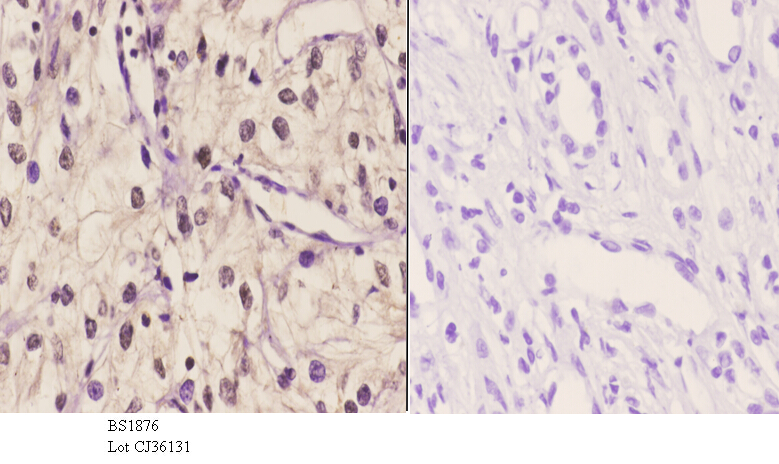Product Name :
TBX1 (K347) polyclonal antibody Background :
The T-box (TBX) motif is present in a family of genes whose structural features and expression patterns support their involvement in developmental gene regulation. The TBX gene family are largely conserved throughout metazoan evolution, and these genes code for putative transcription factors that share a uniquely defining DNA-binding domain. TBX genes are a family of developmental regulators with more than 20 members recently identified in invertebrates and vertebrates. Mutations in TBX genes are associated with the onset of several human diseases. Our understanding of functional mechanisms of TBX products has come mainly from the prototypical T/Brachyury, which is a transcription activator. The TBX genes constitute a family of transcriptional regulatory genes that are implicated in a variety of developmental processes ranging from the formation of germ layers to the organizational patterning of the central nervous system.. Product :
Rabbit IgG, 1mg/ml in PBS with 0.02% sodium azide, 50% glycerol, pH7.2 Storage&Stability :
Store at 4°C short term. Aliquot and store at -20°C long term. Avoid freeze-thaw cycles. Specificity :
TBX1 (K347) polyclonal antibody detects endogenous levels of TBX1 protein. Immunogen :
Synthetic peptide, corresponding to amino acids 321-370 of Human TBX1. Conjugate :
Unconjugated Modification :
Unmodification
TBX1 (K347) polyclonal antibody Background :
The T-box (TBX) motif is present in a family of genes whose structural features and expression patterns support their involvement in developmental gene regulation. The TBX gene family are largely conserved throughout metazoan evolution, and these genes code for putative transcription factors that share a uniquely defining DNA-binding domain. TBX genes are a family of developmental regulators with more than 20 members recently identified in invertebrates and vertebrates. Mutations in TBX genes are associated with the onset of several human diseases. Our understanding of functional mechanisms of TBX products has come mainly from the prototypical T/Brachyury, which is a transcription activator. The TBX genes constitute a family of transcriptional regulatory genes that are implicated in a variety of developmental processes ranging from the formation of germ layers to the organizational patterning of the central nervous system.. Product :
Rabbit IgG, 1mg/ml in PBS with 0.02% sodium azide, 50% glycerol, pH7.2 Storage&Stability :
Store at 4°C short term. Aliquot and store at -20°C long term. Avoid freeze-thaw cycles. Specificity :
TBX1 (K347) polyclonal antibody detects endogenous levels of TBX1 protein. Immunogen :
Synthetic peptide, corresponding to amino acids 321-370 of Human TBX1. Conjugate :
Unconjugated Modification :
Unmodification
-

-
 Immunohistochemistry (IHC) analyzes of TBX1 (K347) pAb in paraffin-embedded human kidney carcinoma tissue at 1:50.showing nucleus staining. Negative control (the right)Using PBS instead of primary antibody, secondary antibody is Goat Anti-Rabbit IgG-biotin followed by avidin-peroxidase.
Immunohistochemistry (IHC) analyzes of TBX1 (K347) pAb in paraffin-embedded human kidney carcinoma tissue at 1:50.showing nucleus staining. Negative control (the right)Using PBS instead of primary antibody, secondary antibody is Goat Anti-Rabbit IgG-biotin followed by avidin-peroxidase.
Bioworld Biotech only provide peptides for our antibodies and do not provide additional peptide customization services.
Price/Size :
USD 368/1mg/vial
Tips:
For phospho antibody, we provide phospho peptide(0.5mg) and non-phospho peptide(0.5mg).Describe :
Blocking peptides are peptides that bind specifically to the target antibody and block antibody binding. These peptide usually contains the epitope recognized by the antibody. Antibodies bound to the blocking peptide no longer bind to the epitope on the target protein. This mechanism is useful when non-specific binding is an issue, for example, in Western blotting (WB) and Immunohistochemistry (IHC). By comparing the staining from the blocked antibody versus the antibody alone, one can see which staining is specific; Specific binding will be absent from the western blot or IHC performed with the neutralized antibody.Formula:
Synthetic peptide was lyophilized with 100% acetonitrile and is supplied as a powder. Reconstitute with 0.1 ml DI water for a final concentration of 10 mg/ml.The purity is >90%,tested by HPLC and MS.
Storage:
The freeze-dried powder is more stable. For short time at 2-8°C. For long term storage store at -20°C.
Note :
This product is for research use only (RUO only). Not for use in diagnostic or therapeutic procedures.
 TBX1 (K347) polyclonal antibody
TBX1 (K347) polyclonal antibody  Datasheet
Datasheet COA
COA MSDS
MSDS SHIP
SHIP